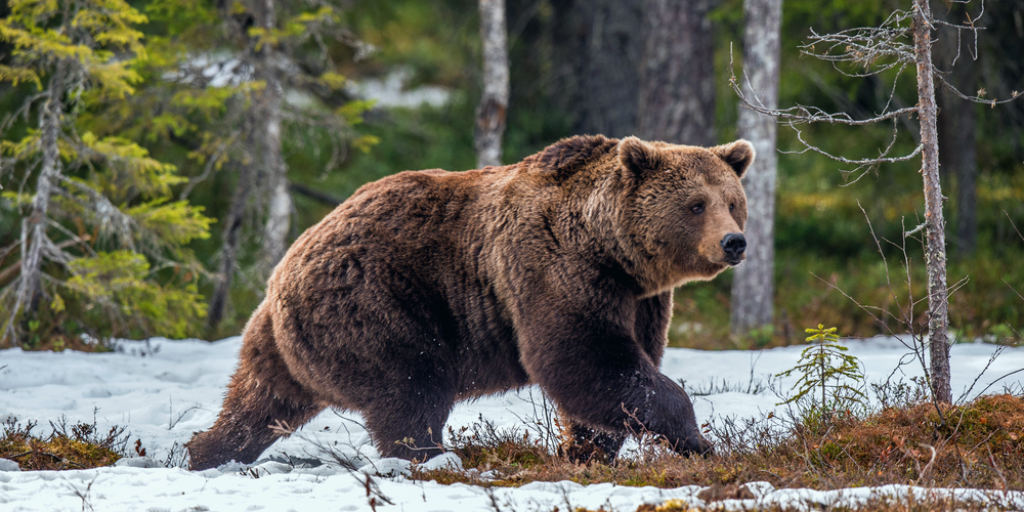Meet the new neighbors. For many residents of Montana and Wyoming, they’re grizzly bears.
Lesson summary
Hi there everyone, I’m Jeff and this is Plain English. This is where you get to improve your English by listening to stories about current events and trending topics. We often—not always, but often—pick stories from the English-speaking world. That way, you get to learn some new words and also learn about the culture and places where the language is spoken.
Today’s story is about bears and humans in the American west. The grizzly bear was almost extinct half a century ago. But the population is rebounding. And that is threatening ranchers, farmers, and residents in the areas near the bear population. Today, you’ll learn how bears and humans are learning to live together.
In every Plain English lesson, we also show you how to use an important expression or phrasal verb in English. Today, that is “pass down.” So in the second half of the audio lesson, you’ll learn how to use that.
This is lesson 644, so you can find the full transcript and all the lesson resources at PlainEnglish.com/644. Our producer, JR, has made sure of that. I think we’re ready to get going. Let’s do this.
Bears and humans are learning to live together
Last year, America’s “Endangered Species Act” turned 50 years old. This 1973 law aims to protect plant and animal species that are at risk of extinction. It’s illegal, in the U.S., to hunt or capture any animal on the list. And government agencies are required to protect the critical habitat of these animals and plants.
One of the first animals to make the Endangered Species list was the grizzly bear. Before European settlers arrived in the Americas, grizzly bears roamed from present-day Canada through present-day Mexico. There were so many grizzly bears in California that the state put the animal on its state flag in 1846.
But there are no grizzly bears in California today. Hunting wiped out 98 percent of the population in North America, including all the bears in California.
Fans of conservation can cheer this, however: the Endangered Species Act appears to have worked for the grizzly bear. The populations are recovering in the western states of Montana and Wyoming. In this area, there were just 136 bears when the Endangered Species Act was passed. Now, there are 1,000. Where once the grizzly bear populations stayed only in the most remote mountain areas, they’re now valleys and prairies where they used to roam.
So is that the happy ending to the story? Not quite.
As the bears move into new territory, they are increasingly coming into conflict with humans. The bears, which can weigh 400 kilograms, are hungriest, and therefore most aggressive, in the fall, when they store up fat for the winter. And last fall, several hikers, hunters, and residents were killed in grizzly bear attacks in the U.S. and Canada.
Ranchers say grizzlies threaten livestock. Residents are afraid for their pets and children. One woman was mauled by a bear as she was running on a street. And just as the bear population has grown, the human population in this area has grown, too. So humans and bears have to learn to live together.
The key is to condition bears not to expect rewards in areas populated by humans. Like humans, bears pass culture and information down from generation to generation. If a bear gets in the habit of eating trash from a dumpster, the bear will teach its cubs to search for food in trash containers. By the same token, bears that stay away from humans teach their cubs to do the same. So it’s best not to give bears any rewards in areas where humans live.
Electric fences can keep bears away from areas they don’t belong. Farmers and ranchers use the fences to secure their cattle, poultry, beehives and other animals. Schools also install electric fences around the perimeter, just in case. Homeowners protect their vegetable gardens that way, too.
Property owners use bear-resistant garbage cans and high, secure fences around trash collection areas. Pet owners are encouraged to put away their birdseed and dog food. Bears also like to eat fallen fruit. So owners of fruit orchards are encouraged to pick their apples and other fruit quickly. During harvest season, local volunteers pick up fallen apples so as not to leave an easy meal on the ground.
Dead livestock can attract bears too; dead livestock is now removed to special composting facilities. Ranchers and families alike are getting dogs trained to protect against bears. The dogs can be outfitted with spiked collars that can injure a bear if the bear attacks the dog.
Even with these protective measures in place , bears sometimes do wander into populated areas. When that happens, bear management specialists step in. Their goal is to teach the bears to stay away. One thing they do is called “aversive conditioning.” They fire bean bags and rubber bullets at the bears—those don’t do the bear any harm, but the goal is to annoy them so they stay away.
If a bear gets trapped in a populated area, they’ll tranquilize the bear and move it to a remote area. As one specialist said, you don’t want bears to get a taste of the good life . Euthanasia is a last resort—but it does happen. Bears that attack people are later euthanized.
Back in Episode 294 , I told you about my trip to Yellowstone National Park. It’s stunning out there—the most beautiful landscape I’ve ever seen. And remote! I went on a hike in a neighboring park and I definitely took bear spray and I attached a bear bell to my backpack. I didn’t mind taking that on a hike. But I don’t think I’d want to carry bear spray every time I went out for a walk.
Learn English the way it’s really spoken

